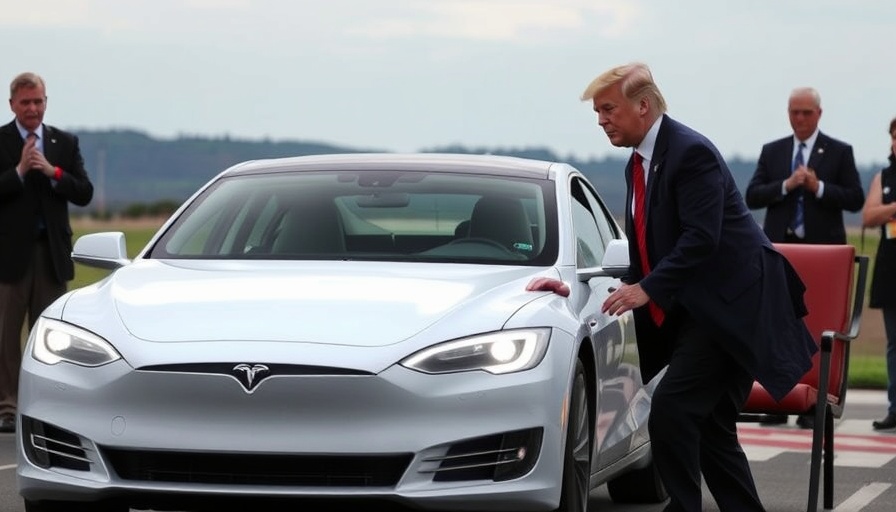
The Political Collision: Trump, Musk, and the Future of American Democracy
The recent remarks made by former President Donald Trump regarding Elon Musk highlight the escalating tensions and the complexities of political allegiances within the United States. Trump threatened Musk with 'very serious consequences' should the Tesla CEO decide to use his financial influence to support Democratic candidates in the upcoming elections. This move is not only a personal affront to Musk but also a reflection of the broader political climate where business leaders are expected to pick sides, especially in an era where corporate influence is under intense scrutiny.
Impacts on Corporate Politics and Accountability
Trump's warning underscores a growing trend in which corporate leaders find themselves entangled in political narratives, particularly as the midterm elections approach. Some may view Musk's potential funding of Democrats as a betrayal of the Republican base that has supported him. However, others see it as a necessary evolution of corporate responsibility, where businesses play a role in shaping governance and policy for the greater good. This duality raises vital questions: Should billionaires prioritize political alignment over ethical commitments? How can they navigate the treacherous landscape of partisan politics while maintaining a neutral business focus?
A Broader Reflection on Sectional Allegiances in Politics
The stark divide seen in responses to Musk's potential funding also highlights a more significant issue: the polarization of American politics. This is particularly relevant as it mirrors sentiments in other nations grappling with similar divides, including South Africa. The intense rivalry between the African National Congress (ANC) and the Democratic Alliance (DA) illustrates how political factions can manipulate public figures and corporations in their pursuit of power. The reality is that targeted funding from influential figures, like Musk, could shift the tides in favor of certain political agendas, raising ethical concerns about accountability and the integrity of democratic processes.
Trump's Engagement Strategy: Vows and Threats
Trump's rhetoric aims not only to intimidate Musk but also to reinforce loyalty among his supporters by framing the narrative of corporate allegiance. By positioning himself as a protector of conservative values against perceived liberal encroachment, he taps into the ongoing frustrations around 'state capture' and corruption, issues that have often dominated South African politics and resonate deeply with voters across the globe who feel disenchanted with the status quo.
The Economic Implications of Political Funding
Trump's warning raises critical questions concerning economic recovery and the potential impacts of political funding on business operations in a volatile economic environment. The ongoing challenges faced by the U.S. economy, including inflation rates and unemployment rates, mean that corporate funding in elections could have far-reaching implications. Political contributions can destabilize balanced development, especially in countries like South Africa, where corruption investigations are rife among state-owned enterprises. How political donations influence policy decisions—whether regarding healthcare reform, public transport, or infrastructure development—becomes critical in understanding the ramifications of corporate financial involvement in governance.
A Global Perspective: Corporate Influence Beyond Borders
The intersection of corporate contributions and politics is not strictly an American phenomenon; it is echoed in various global contexts. In nations grappling with power dynamics, such as through BRICS relations and SADC governance, the implications of funding decisions by leaders like Musk resonate. As countries around the world witness growing mistrust in governing bodies, discussions around transparency and ethical investment are more relevant than ever. This raises the stakes for political leaders and corporate magnates alike, urging a rethink on the roles they play in democratic processes.
Looking Forward: The Need for Responsible Leadership
Ultimately, as Trump continues to stake his claim in the political arena, both he and Musk must navigate the complex repercussions of their decisions. Their paths exemplify the tension between ideological fidelity and the greater societal implications of their actions. Moving forward, business leaders must engage with political systems thoughtfully, ensuring that their contributions—financial or otherwise—promote greater accountability and transparency in governance.
As citizens and professionals, we must remain vigilant, advocating for transparency in political funding and holding both our leaders and corporations accountable. The choices made today shape the political landscapes of tomorrow, influencing everything from economic recovery to public service delivery.
 Add Row
Add Row  Add
Add 




Write A Comment